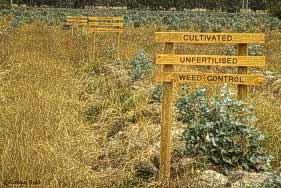|
Some Trees can be Weeds

Robina pseudoacacia, a highly regarded
timber durable
species from the USA, choking a stream on a farm in southern
NSW.
When
searching for new and profitable timber species there is a
risk that farmers may introduce or encourage the spread of
serious weeds. Many introduced commercial tree species are
themselves weeds. For example, pines are able to invade native
forest due to their tolerance of shade and tagasaste, a promising
fodder tree, is a serious weed of native forests on sandy
soils in Victoria. Amongst the alternative timber species
many have become serious 'urban' weeds, having escaped from
ornamental plantings.
Farmers
need to be aware of the risks of introducing new species to
an area that might be further spread by stock, birds, wind,
water or other means. Once established the cost of control
can be very much more than the contribution these trees might
make to the farm. Introducing new genetic material of native
species can also irreversibly change the genetic composition
of existing vegetation in the area. This can happen through
hybridisation or interbreeding and can be very difficult to
reverse in the future.
There
are a number of web sites that can be used to assess the weed
risk of particular species:
The
Global compendium of weeds is a useful start when researching
exotic species.
Within
Australia the Australian
Quarantine Inspection Service (AQIS) provides an Import
Conditions Database which lists the import conditions of various
commodities and advises whether you require a permit, inspection,
mandatory treatment or minimal entry requirements to import
your species.
The
Department
of Agriculture in Western Australia provides comprehensive
information on the weed characteristics of many species.
As
an example, we recently received a request for information
on African Blackwood Dalbergia melanoxylon (ebony). Dalbergia
melanoxylon produces one of the finest timbers in the world,
with round logs of this species fetching up to US$18,000/m3.
This timber is used in Australia in musical instruments and
as is used as inlays in fine furniture.
Our
research found that this species had been imported to Australia
as a promising timber species and planted in a trial in Western
Australia. However, it was soon discovered that the species
is a very aggressive weed and was quickly eradicated from
the trial. Knowledge of the extreme weediness of this timber
was not widespread. Despite the potential value of the timber,
this was an important reminder of the risks of introducing
new species into the country or into a new area.
Please
be careful when introducing new species to your farm. Watch
for initial signs of weediness and eradicate any species that
is likely to get out of control.
Back
to top
|
